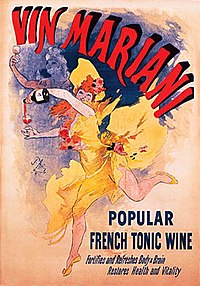 | |
| Type | Wine |
|---|---|
| Country of origin | France |
| Introduced | 1863 |
Coca wine is an alcoholic beverage combining wine with cocaine.[1] One popular brand was Vin Mariani, developed in 1863 by French-Corsican chemist and entrepreneur Angelo Mariani.[2]
At the end of the 19th century, the fear of drug abuse made coca-based drinks less popular. This led to the prohibition of cocaine in the United States in 1914 via the Harrison Narcotics Tax Act, and the removal of cocaine from coca wine, though coca leaf remained.[2] Coca wine itself became illegal in the United States when its other main drug, alcohol, was banned just a few years later with the Eighteenth Amendment in 1920.
-
Peruvian Wine of Coca
-
Coca Mariani medal by Louis-Oscar Roty
Related beverages[edit]
In Atlanta, John Pemberton, a pharmacist, developed a beverage based on Vin Mariani, called Pemberton's French Wine Coca. It proved popular among American consumers. In 1886, when Georgia introduced Prohibition, Pemberton had to replace the wine in his recipe with non-alcoholic syrup. The new recipe became Coca-Cola.[2]
Physiological effects[edit]
The combination of cocaine and alcohol leads to the formation of cocaethylene in the body.[3] Studies suggest the compound decreases the feelings of drunkenness from alcohol alone and heightens euphoric sensations, but is also potentially cardiotoxic,[4] more so than either cocaine or alcohol alone.[5][3]
References[edit]
- ^ G. Harding (2005). A Wine Miscellany. New York: Clarkson Potter Publishing. p. 10. ISBN 0-307-34635-8.
- ^ a b c "Coca Wine". cocaine.org. Retrieved 2007-02-12.
- ^ a b Farooq, Muhammad U.; Bhatt, Archit; Patel, Mehul B. (September 2009). "Neurotoxic and cardiotoxic effects of cocaine and ethanol". Journal of Medical Toxicology. 5 (3): 134–138. doi:10.1007/BF03161224. PMC 3550388. PMID 19655286.
- ^ Farré, M; de la Torre, R; Llorente, M; Lamas, X; Ugena, B; Segura, J; Camí, J (September 1993). "Alcohol and cocaine interactions in humans". The Journal of Pharmacology and Experimental Therapeutics. 266 (3): 1364–73. PMID 8371143.
- ^ Wilson, LD; Jeromin, J; Garvey, L; Dorbandt, A (March 2001). "Cocaine, ethanol, and cocaethylene cardiotoxity in an animal model of cocaine and ethanol abuse". Academic Emergency Medicine. 8 (3): 211–22. doi:10.1111/j.1553-2712.2001.tb01296.x. PMID 11229942.
External links[edit]
 Media related to Cocawine at Wikimedia Commons
Media related to Cocawine at Wikimedia Commons- University of Buffalo "Before Prohibition: Images from the preprohibition era when many psychotropic substances were legally available in America and Europe" Addiction Research Unit

